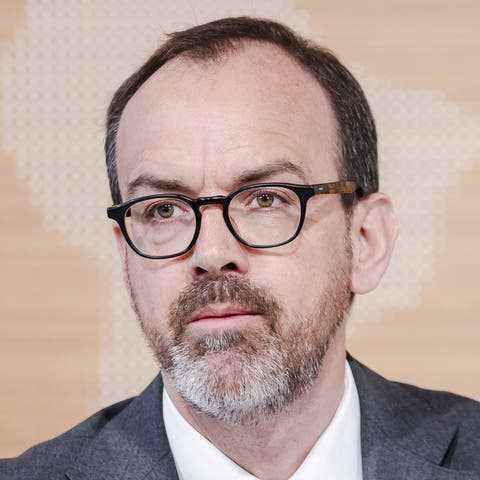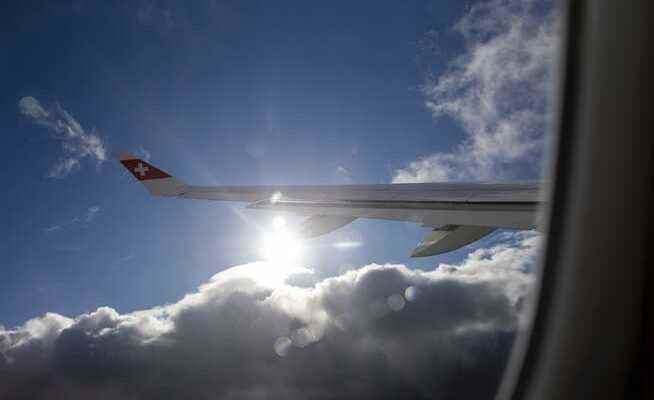Despite the staff shortage, CFO Markus Binkert sees no need to raise wages. The increasing demand also allows Swiss to cancel the federal credit line and thus get rid of the state as a creditor.
For the airline Swiss, the mood is brightening again after two difficult years, and demand is picking up.
Mr. Binkert, what is the booking situation for the summer months?
When it comes to bookings, we see a much more positive picture than a few months ago. Customers are booking longer than at the beginning of the year, when we could hardly predict three weeks. Now we are booking again until September and October. In certain weeks we even see higher booking numbers than in 2019. We feel the need to catch up in holiday and business travel, which has been at a low level for a very long time.
What does that mean for the capacities with which Swiss operates?
For 2023 we expect 85 percent of the capacity of 2019. We resized the company accordingly in the course of the Corona crisis. This year we are well below that: During the traditionally strong summer months, we come to 70 to 80 percent. For 2022 as a whole, this corresponds to a capacity of around 70 percent.
A total of 1,700 full-time jobs fell victim to the strong resizing, which is now causing problems for Swiss: Swiss has too few staff to meet the increasing demand, especially in the cabin.
In our industry, the lack of personnel affects the whole world and the entire supply chain. It has to do with the rapid restart of the air traffic infrastructure. We eliminated 1,700 full-time positions to reduce fixed costs and to be properly positioned for our 85 percent capacity target in 2023. This is the case now. The situation with cabin crew is indeed challenging at the moment. That is why we are working flat out to recruit new employees. Over the course of the year, Swiss hires new cabin crew members in the three-digit range.
The lack of staff leads to flight cancellations, as Swiss only announced on Tuesday. This is not the service you would expect from a premium airline.

Swiss CFO Markus Binkert
It is important to us that we can offer our customers a stable flight schedule. In view of the industry-wide resource bottlenecks, which also affect us, we unfortunately cannot rule out flight cancellations. It’s not always just us. For example, we also get inquiries from airports asking us to reduce capacity.
At Zurich Airport, things have been largely trouble-free so far. Who is calling you?
That’s right. Various European airports approached us.
How many cancellations do Swiss passengers have to brace themselves for in the coming weeks?
We will do our best to avoid further cancellations for the summer. If this is not possible, we will do everything we can to inform our passengers as early as possible. Almost 10,000 passengers are affected by the current cancellations, which corresponds to less than 1 percent of flight bookings for July and August.
Swiss is not the only airline looking for staff. Do you pay higher wages?
No, no wage increases are planned to attract more staff. We pay the wages we pay everyone else in the cabin, at the same level as before the crisis. We receive many applications, which shows us that we are still an attractive employer. In the summer we run various training courses. In addition, since April, half of the dismissed cabin employees have returned to Swiss.
The mood among the remaining cabin crew is considered tense due to the heavy workload. Did you thank the employees with a bonus?
Yes we have got that. This year we paid all employees a workload-adjusted bonus of CHF 1,000 to say thank you for their hard work. We have also promised another bonus if we actually break even at the end of the year. We are still confident that we will succeed. The important thing to understand is that if we break even again this year, we haven’t earned anything, we’ve just stopped the losses. We will be very grateful if we achieve this level of stability and succeed in flying back into profitability in 2023 and thus being able to invest again.
Swiss has terminated the credit line of up to CHF 1.5 billion since June 1st. With that you are rid of the covenant as a creditor. Why is now the right time?
March and April showed that the booking situation was developing very solidly. This convinced us that now is the right time to reschedule. The Lufthansa Group was able to take out a credit line of two billion euros in the first quarter. As Swiss, we can now also benefit from this and finance ourselves more cheaply on the capital market via the Lufthansa Group.
According to its own statements, Swiss has never had to draw on more than half of the credit line. How necessary was it for the federal government to step in as a guarantor at the time?
Without this credit line, Swiss would not have survived 2020 in terms of liquidity. We are therefore very grateful that the loan was granted to us. 2020 was the year of survival for us. The loan was essential to keep the airline in Switzerland. In turn, he gave us the necessary time to restructure and position ourselves for the new market conditions. 2021 was the year of restructuring for us.
How normal were these borrowing costs?
The question is justified: what is customary in the market at a point in time when there is no longer a market? No bank would have supported us back then without the guarantee from the federal government. In total, we paid 60 million francs in interest and fees over the entire term. Thanks to the refinancing via the Lufthansa Group on the capital market, we are now paying around half of the interest and fees.
How well is Swiss protected against the high kerosene prices?
We see high and extremely volatile kerosene prices. Two thirds of the demand in the current year are secured in terms of price. This helps us smooth out this rapid rise. Nevertheless, it is clear that flying is becoming more expensive and we cannot avoid passing this on to our passengers.
